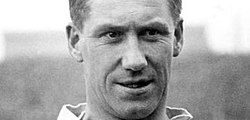Jimmy Seed
 |
|||
| Personal information | |||
|---|---|---|---|
| Full name | James Marshall Seed | ||
| Date of birth | 25 March 1895 | ||
| Place of birth | Blackhill, England | ||
| Date of death | 16 July 1966 (aged 71) | ||
| Place of death | Farnborough, England | ||
| Height | 5 ft 10 in (1.78 m) | ||
| Playing position | Inside forward | ||
| Youth career | |||
| 19??–1914 | Whitburn F.C. | ||
| 1914–1919 | Sunderland | ||
| Senior career* | |||
| Years | Team | Apps | (Gls) |
| 1919–1920 | Mid Rhondda | ||
| 1920–1927 | Tottenham Hotspur | 229 | (64) |
| 1926–1931 | Sheffield Wednesday | 134 | (32) |
| Total | 363 | (96) | |
| National team | |||
| 1921–1925 | England | 5 | (1) |
| Teams managed | |||
| 1931–1933 | Clapton Orient | ||
| 1933–1956 | Charlton Athletic | ||
| 1958–1959 | Millwall | ||
| * Senior club appearances and goals counted for the domestic league only. |
|||
James Marshall "Jimmy" Seed (born Blackhill, Consett 25 March 1895, died July 1966) was an English footballer and football manager.
Despite being born in Blackhill, Seed was brought up in the village of Whitburn on the coast just to the north of Sunderland. The family moving when Jimmy was only two years old .
On leaving school at 14, Seed worked at Whitburn colliery and when he reached 16 played football in the Wearside League for Whitburn F.C. along with his brother Angus who would have a short professional career with Leicester Fosse. After scoring over 80 goals for Whitburn Jimmy had unsuccessful trials at South Shields and Sunderland. However Sunderland manager Bob Kyle decided to give Seed a second chance this time playing him at inside right instead of centre forward in a North Eastern League match against Wallsend. Seed scored a hat-trick in the match and was promptly signed by Sunderland as a professional in April 1914.
Seed spent the 1914–15 season playing in Sunderland reserves, he scored plenty of goals as the team lifted the Durham Senior Cup. Official League football was suspended at the end of that season because of the outbreak of World War I. The 20-year-old Seed joined the 8th battalion of the West Yorkshire Regiment and was drafted to France. In the last months of the war he was gassed and returned to England to convalesce. With the cessation of hostilities, Seed played a Victory League match for Sunderland against Durham City in 1918, however he was not fit and had a poor game. On the strength of that performance the Sunderland directors decided that Seed's wartime experience had finished him as a footballer and gave him a free transfer. Seed never played an official first team game for Sunderland.
...
Wikipedia
